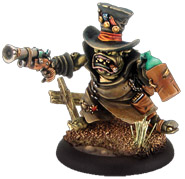When I began to contemplate writing a post about steampunk board games, I didn’t anticipate any difficulty: there are games on just about every topic, right? I looked at my own collection…none there. I polled my gaming group’s considerable resources…none there either. I widened my search to the global gaming community, and even solicited possible suggestions from them, but I was less than enthused about the responses I received. I was left to conclude that steampunk is primarily a visual aesthetic, and while many games have a bit of steampunk art here and there, very few fully integrate the theme.
I was about to abandon the project and declare that steampunk was still waiting for its breakthrough board game when I made one last attempt. Being somewhat familiar with the gothic aspects of Warhammer 40K, I decided to widened my consideration to roleplaying games, miniatures gaming, and board games featuring miniatures. To my surprise, I found games that were not just visually stunning, but, from a game player’s perspective, innovative as well.
For the purposes of this post I am using a liberal definition of steampunk, including alternate histories and anachronistic technologies, such as dieselpunk and steampunk/fantasy hybrids.

Malifaux by Wyrd Miniatures LLC is a skirmish game in a truly bizarre setting. The battles in Malifaux take place on an alternate earth, at first glance looking much like the Wild West. However, look more closely and you’re likely to see a six-gun slinging gremlin, a spell-casting undertaker, steam powered brass arachnids, or a brothel filled with undead tramps. The world of Malifaux is described by the publisher as “a lawless world rife with monsters, necropunks, man-machine hybrids, gunslingers, and power-hungry politicos.” A world where soulstone is mined like gold, but is much more valuable because soulstone enables magic.
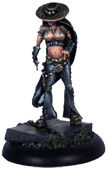 Unlike many other miniatures games, Malifaux does not focus on large scale combat between rival armies, instead, Malifaux focuses on small crews consisting of a master and four to five minions. Each figure in a crew is unique, with its own back-story and special abilities that impact game-play. Not all skirmishes are death matches. Instead an objective is randomly determined, such as a
Unlike many other miniatures games, Malifaux does not focus on large scale combat between rival armies, instead, Malifaux focuses on small crews consisting of a master and four to five minions. Each figure in a crew is unique, with its own back-story and special abilities that impact game-play. Not all skirmishes are death matches. Instead an objective is randomly determined, such as a 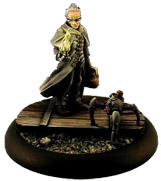 soulstone claim jump, reconnoiter, or treasure hunt, and players then select crews they believe most fit for the task at hand. Another innovation for Malifaux includes a diceless combat system where players hold a hand of cards and must carefully manage the play of these cards to resolve combat and other game activities.
soulstone claim jump, reconnoiter, or treasure hunt, and players then select crews they believe most fit for the task at hand. Another innovation for Malifaux includes a diceless combat system where players hold a hand of cards and must carefully manage the play of these cards to resolve combat and other game activities.
Malifaux is played with highly stylized, 32mm heroic scale miniatures. The exaggerated scale allows incredibly detailed castings and action poses not often seen in the more typical 28mm scale. However, this scale also makes the figures difficult to use with other game systems. Malifaux is relatively inexpensive to play by miniature gaming standards. The core rule book lists for $35, and two boxed sets of crews (between five and seven figures each) will also be required, at about $35 each. At first glance $105 might seem steep, but it provides everything needed for two players to field challenging and entertaining battles; talk to 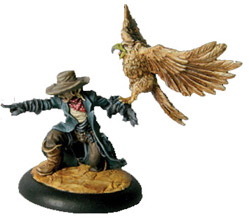 a veteran Warhammer 40K player and you’ll learn that this is downright cheap in comparison. Individual and box set figures are available increase the number of players and expand their options. Malifaux miniatures are sold unpainted, and some require assembly.
a veteran Warhammer 40K player and you’ll learn that this is downright cheap in comparison. Individual and box set figures are available increase the number of players and expand their options. Malifaux miniatures are sold unpainted, and some require assembly.
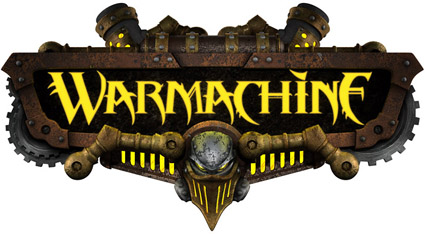
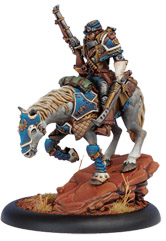 Warmachine Prime Mk II by Privateer Press is a miniatures battle game set in the Iron Kingdoms, a world using the D20 role playing system. Warmachine and Iron Kingdoms combine traditional fantasy creatures and races with steampunk style technologies. Battles revolve around Warcasters, powerful sorcerers that have learned the art of controlling Warjacks, six-ton steam-powered fighting machines equipped with cannons, giant hammers, and a variety of other weapons.
Warmachine Prime Mk II by Privateer Press is a miniatures battle game set in the Iron Kingdoms, a world using the D20 role playing system. Warmachine and Iron Kingdoms combine traditional fantasy creatures and races with steampunk style technologies. Battles revolve around Warcasters, powerful sorcerers that have learned the art of controlling Warjacks, six-ton steam-powered fighting machines equipped with cannons, giant hammers, and a variety of other weapons.
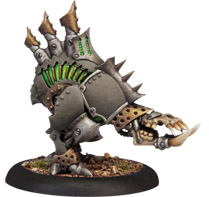 Like Malifaux, Warmachine depicts skirmish-level conflicts and can be played using a limited number of models. The core rules list for $29.99, and Battle Boxes are designed to provide new players with a complete fighting unit, typically one Warcaster, a Warjack, and supporting figures. Battle Boxes list for $50 each, and figures may also be purchased individually. The core rules plus two Battle Boxes are enough to get players started. Warmachine miniatures are sold unpainted.
Like Malifaux, Warmachine depicts skirmish-level conflicts and can be played using a limited number of models. The core rules list for $29.99, and Battle Boxes are designed to provide new players with a complete fighting unit, typically one Warcaster, a Warjack, and supporting figures. Battle Boxes list for $50 each, and figures may also be purchased individually. The core rules plus two Battle Boxes are enough to get players started. Warmachine miniatures are sold unpainted.

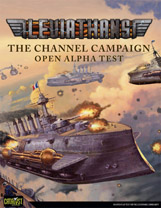 Leviathans, by Catalyst Game Labs is a dieselpunk naval battle game still under development, with no firm release date. I choose to include it mostly because the setting and preproduction art look cool. Leviathans depicts an alternate history of World War I in which the Polish inventor Rynchowski discovers an electrical lifting fluid that allows giant battleships to patrol the skies above Europe during the 1910s.
Leviathans, by Catalyst Game Labs is a dieselpunk naval battle game still under development, with no firm release date. I choose to include it mostly because the setting and preproduction art look cool. Leviathans depicts an alternate history of World War I in which the Polish inventor Rynchowski discovers an electrical lifting fluid that allows giant battleships to patrol the skies above Europe during the 1910s.
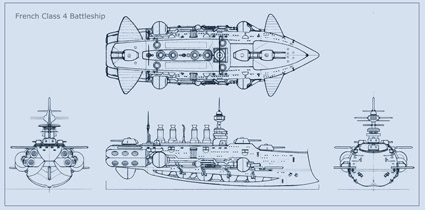
Each ship is represented by a miniature and a printed ship systems display. Miniatures maneuver for firing position on a map, while the systems display is used to track damage and other game functions. Considerable effort is being invested to create an immersive world for Leviathan, including short fiction available on the publisher’s website. For those interested in trying the game, basic rules and an initial campaign are available as a free download here, although you’ll have to manufacture stand-ins for the miniatures, and some of the free download content may be discontinued after October 31, 2010. The Lieutenant’s Manual is a more complete set of rules available as a download for $2.99.
In Tannhäuser, by Fantasy Flight Games we are introduced to a world in which the first World War has never ended. It is 1949 and war has been raging for 35 years. In an effort to break the stalemate, Union forces have developed experimental weapons based on alien technologies discovered in a wreckage at Roswell, New Mexico. Fearing loss of the arms race, the Reich has tasked its brightest mind, Marquis General Hermann Von Heïzinger to raise an army of masters of the occult, the Obscura Korps. Mother Russia has also entered the war as an independent combatant “fuled by the genius of Tesla, and his electrical weaponry.”
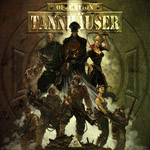 Tannhäuser is a tactical combat game featuring small squads of five figures per side. Tannhäuser’s greatest strength is the customization available for each figure in terms of weapons selection and special abilities. The game was highly anticipated prior to its 2007 release, but a flawed first edition rulebook lead to a lukewarm reception. A revised rulebook has been released which addresses most player’s concerns, and with this revision Tannhäuser is considered an excellent game. Unlike other games in this post, Tannhäuser is marketed as a board game: everything needed to play, including ten pre-painted plastic miniatures, is sold in a single box with a list price of $69.95. Numerous expansions and figure packs are also available.
Tannhäuser is a tactical combat game featuring small squads of five figures per side. Tannhäuser’s greatest strength is the customization available for each figure in terms of weapons selection and special abilities. The game was highly anticipated prior to its 2007 release, but a flawed first edition rulebook lead to a lukewarm reception. A revised rulebook has been released which addresses most player’s concerns, and with this revision Tannhäuser is considered an excellent game. Unlike other games in this post, Tannhäuser is marketed as a board game: everything needed to play, including ten pre-painted plastic miniatures, is sold in a single box with a list price of $69.95. Numerous expansions and figure packs are also available.
All miniatures depicted in this post were professionally painted by employees of their respective game manufacturers. Credit for both sculptors and painters may be found on the Wyrd Miniatures website for the Malifaux figures. List price for games, rule books, and miniatures is provided for comparison only: retail prices are typically lower.
When not letting off steam playing games, Bob Gallo is a computer programmer specializing in Flash and interactive application design. Bob got his gaming start in the mid 1970s with traditional hex-and-counter war games, and has played nearly all types of games including role playing games, miniatures, collectible card games, video/PC games, and traditional board and card games. He lives in the Charlotte, NC area.










